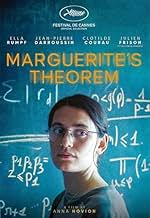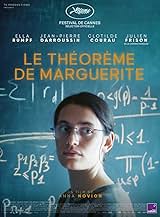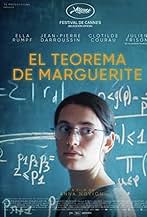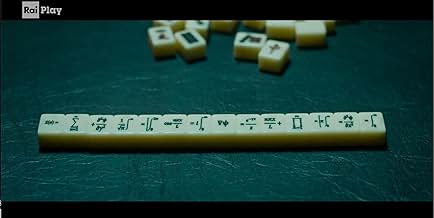VALUTAZIONE IMDb
6,8/10
2629
LA TUA VALUTAZIONE
Una brillante studentessa di matematica presso la migliore università francese, l'Ecole Normale Supérieure, presenta la sua tesi, ma un errore sconvolge ogni certezza nella sua vita pianific... Leggi tuttoUna brillante studentessa di matematica presso la migliore università francese, l'Ecole Normale Supérieure, presenta la sua tesi, ma un errore sconvolge ogni certezza nella sua vita pianificata. Lascia tutto e ricomincia da capo.Una brillante studentessa di matematica presso la migliore università francese, l'Ecole Normale Supérieure, presenta la sua tesi, ma un errore sconvolge ogni certezza nella sua vita pianificata. Lascia tutto e ricomincia da capo.
- Regia
- Sceneggiatura
- Star
- Premi
- 4 vittorie e 1 candidatura in totale
Xiaoxing Cheng
- M. Kong
- (as Maurice Cheng)
Karl Ruben Noel
- Le danseur
- (as Karl-Ruben 'Rubix' Noël)
Pakirathan Sulakshan
- Le mathématicien
- (as Sulax Pakirat)
Recensioni in evidenza
I hate mathematics, I have always hated them, but I love this movie which doesn't need to be a good expert in maths to appreciate it. It is a true authentic character study about a young woman who is an expert in maths and whose world suddenly collapses when she realizes that all her theories don't match anymore. This is not a comedy, a stupid comedy which French film industry has the secret, but a true riveting story, that the French has also the secret of...Never boring and you always wonder what the following scene will be. Nothing predictable. What could we ask for? Not a masterpiece but what for after all?
Despite familiar themes, the movie is well-made and avoids being overly dramatic. It is well worth watching and takes more after the movie 21 than 'Good Will Hunting' or 'A Beautiful Mind'. A very solid performance by Ella Rumpf (known from the movie "Raw") who portrays Marguerite. Starts a bit slow but if you bite the bullet and continue watching, you will be rewarded. Some plot twists are predictable (just like in the movie "21"), but others you will not see coming. The movie explores a common problem, talented young people who get discouraged when they realize success isn't guaranteed. Marguerite is a brilliant math student who crumbles when her big theorem turns out to be wrong. While the movie explores familiar territory (genius obsessed with proving themselves), it might not resonate with everyone unless you're really into number theory (a specific branch of mathematics). The film uses camera tricks to show how overwhelmed Marguerite feels and how she struggles to decide between her passion for math and the harsh realities of the world. I also loved the movie and the performances of Julien Frison (Lucas) and Sonia Bonny (Noa). But Ella Rumpf (Marguerite Hoffmann) takes the crown. Perfect casting for this role. Rated the movie 9/10 and well deserved. No need to say that this is a must see (despite the slow start).
10kosmasp
No pun intended - math was something I loved in school too. But when we got to higher math (that's not a pun, right?) I felt like I lost the thread. I really like how the movie presents itself though. It has so many elements (or variables to stay and stick with the theme of the movie) ... and they all work well together! Be it actors, the story, developments, relationships and so much more.
The good thing is that while the math presented is quite complicated (I assume they double checked and everything is legit in the movie, I can't say for certain though), it is more a byproduct ... so don't worry too much about it. I didn't get it either - but you don't have to. Because this is more about the woman and human finally being able to get a breakthrough .. .or more than one that is. That's why I thought I make this my review 11088 ... I mean I didn't plan the release of the movie in the cinemas ... but since it played right now and I was almost at the number, I was able to pin it down to that.
I did not paint that on a chalkboard (wall) ... while she is thickheaded (our main character), we will love her ... we will feel for and with her ... she is quite gullible, but also weird and stubborn ... and so many other things! Kudos to the actress who probably is nothing like that in real life. A beautiful ... also mind (actually I could have used that as a summary headline - always with my no pun intended trademark of course) ...
The good thing is that while the math presented is quite complicated (I assume they double checked and everything is legit in the movie, I can't say for certain though), it is more a byproduct ... so don't worry too much about it. I didn't get it either - but you don't have to. Because this is more about the woman and human finally being able to get a breakthrough .. .or more than one that is. That's why I thought I make this my review 11088 ... I mean I didn't plan the release of the movie in the cinemas ... but since it played right now and I was almost at the number, I was able to pin it down to that.
I did not paint that on a chalkboard (wall) ... while she is thickheaded (our main character), we will love her ... we will feel for and with her ... she is quite gullible, but also weird and stubborn ... and so many other things! Kudos to the actress who probably is nothing like that in real life. A beautiful ... also mind (actually I could have used that as a summary headline - always with my no pun intended trademark of course) ...
It's a truth not quite universally acknowledged that films about hard intellectual or creative work, well, suck. I'm not sure if higher mathematics is particularly prone (all of Good Will Hunting except the Robin Williams bits; the -entirety- of A Beautiful Mind; everything but the facts of that Ramanujan film are at least as far removed as, say, Star Wars is and from astrophysics).
This, though, does not.
The central character is not a transcendent but flawed genius but hardworking and self-denying; the moments of inspiration (which are a real thing) look real and come through sheer effort, not effortless revelation with accompanying sound effects; and the scholarly politicking and casual STEM sexism are, well, true to life.
But - and this is probably burying the lede, sorry - it is also (1) splendid performances by all of the main cast; (2) a very thoughtful reflection on the connection between abstract thought and the human condition; and (3) an actually enjoyable film.
This, though, does not.
The central character is not a transcendent but flawed genius but hardworking and self-denying; the moments of inspiration (which are a real thing) look real and come through sheer effort, not effortless revelation with accompanying sound effects; and the scholarly politicking and casual STEM sexism are, well, true to life.
But - and this is probably burying the lede, sorry - it is also (1) splendid performances by all of the main cast; (2) a very thoughtful reflection on the connection between abstract thought and the human condition; and (3) an actually enjoyable film.
Here is a movie that will interest my mathematician friends. I look forward to them watching it and sharing their impressions. 'Le théorème de Marguerite' (2023) is a variation on the classic formula 'boy meets girl, boy loses girl, boy gets girl back', with a few changes. First of all, the lead character is a woman, a young and brilliant mathematician who will meet a boy, so it's more like 'girl meets boy'. And yes, both the girl and the boy are mathematicians, so 'a mathematician girl meets a mathematician boy'. Otherwise, the formula applies - in cinema and in mathematics. The film by director Anna Novion is a film about the passion for mathematics. There aren't many movies that bring math heroes to the screen, but a few of them are memorable. 'Good Will Hunting' and 'A Beautiful Mind', for example, also offered us heroes whose life and passion are consumed in front of blackboards filled with mathematical equations. 'Le théorème de Marguerite' aims to join this select club.
The heroine of the film is called Marguerite Hoffman. She is a brilliant PhD student at one of the most prestigious colleges in France and mathematics is her whole life. The doctoral thesis supervised by Professor Werner is a demonstration of one of the most famous problems that mathematicians have faced for centuries: the Goldbach conjuncture. (for the curious: 'Any even number is the sum of two prime numbers'). The proposition was verified by numerical computers until they ran out of power, but it was never proved. On the day of the thesis presentation, however, a catastrophe occurs. Julien, another brilliant young mathematician who had joined Wener's team a few days before, points out a fatal flaw in the proof. Marguerite has a total mental breakdown and decides to abandon mathematics and the teacher whom she blames for betraying her by associating with the new student. She will try to work as a saleswoman, she will meet Noa, a dancer with whom she shares a rented apartment and who will try to bring her back to life. Marguerite, however, may leave mathematics, but mathematics does not leave her. The talent will help her become a brilliant mahjong player (a complex Chinese game with stones) and her orderly mathematical mind will struggle with feelings for the rival she associates with in solving the impossible problem.
Can love be rationalized? Can human mind function in the absence of feelings? You will receive answers to these questions in the story Anna Novion co-wrote. The main problem with the film is, in my opinion, the fact that these answers are kind of what we expected. Focus is on mathematics and love. Social aspects that might have been interesting - the position of women in academia, the life of the Chinese community in Paris - are touched upon only tangentially. The plot is also quite predictable. A bit more boldness and a story with more surprises wouldn't hurt. Fortunately, much of these weaker parts are offset by Ella Rumpf's formidable acting performance. The actress is no longer very young, she is more than ten years older than the heroine she plays in this film and has a filmography of almost 20 films behind her. And yet, with this role she won the Lumiere award for 'best female revelation' and four other awards - completely deserved. Her Marguerite Hoffman is intelligent and vulnerable, passionate to the point of obsession when it comes to the mathematics she has known since childhood and when it comes to the love she discovers late. With any luck for her and us viewers, 'Le théorème de Marguerite' is the first major film of a great actress. Among the other actors in the cast, I cannot skip Jean-Pierre Darroussin in the role of the teacher who guides the heroine's steps in mathematics even when their paths diverge, alongside the girl's mother played by Clotilde Courau. Goldbach's conjuncture is still waiting for its demo, and we, the viewers, are waiting for the future films of director Anna Novion and actress Ella Rumpf.
The heroine of the film is called Marguerite Hoffman. She is a brilliant PhD student at one of the most prestigious colleges in France and mathematics is her whole life. The doctoral thesis supervised by Professor Werner is a demonstration of one of the most famous problems that mathematicians have faced for centuries: the Goldbach conjuncture. (for the curious: 'Any even number is the sum of two prime numbers'). The proposition was verified by numerical computers until they ran out of power, but it was never proved. On the day of the thesis presentation, however, a catastrophe occurs. Julien, another brilliant young mathematician who had joined Wener's team a few days before, points out a fatal flaw in the proof. Marguerite has a total mental breakdown and decides to abandon mathematics and the teacher whom she blames for betraying her by associating with the new student. She will try to work as a saleswoman, she will meet Noa, a dancer with whom she shares a rented apartment and who will try to bring her back to life. Marguerite, however, may leave mathematics, but mathematics does not leave her. The talent will help her become a brilliant mahjong player (a complex Chinese game with stones) and her orderly mathematical mind will struggle with feelings for the rival she associates with in solving the impossible problem.
Can love be rationalized? Can human mind function in the absence of feelings? You will receive answers to these questions in the story Anna Novion co-wrote. The main problem with the film is, in my opinion, the fact that these answers are kind of what we expected. Focus is on mathematics and love. Social aspects that might have been interesting - the position of women in academia, the life of the Chinese community in Paris - are touched upon only tangentially. The plot is also quite predictable. A bit more boldness and a story with more surprises wouldn't hurt. Fortunately, much of these weaker parts are offset by Ella Rumpf's formidable acting performance. The actress is no longer very young, she is more than ten years older than the heroine she plays in this film and has a filmography of almost 20 films behind her. And yet, with this role she won the Lumiere award for 'best female revelation' and four other awards - completely deserved. Her Marguerite Hoffman is intelligent and vulnerable, passionate to the point of obsession when it comes to the mathematics she has known since childhood and when it comes to the love she discovers late. With any luck for her and us viewers, 'Le théorème de Marguerite' is the first major film of a great actress. Among the other actors in the cast, I cannot skip Jean-Pierre Darroussin in the role of the teacher who guides the heroine's steps in mathematics even when their paths diverge, alongside the girl's mother played by Clotilde Courau. Goldbach's conjuncture is still waiting for its demo, and we, the viewers, are waiting for the future films of director Anna Novion and actress Ella Rumpf.
Lo sapevi?
- QuizAccording to a NY Times article a reward of 1 million dollars was offered offered from 2000 to 2002. Currently there is no official monetary prize specifically for proving or disproving Goldbach's Conjecture similar to the prizes offered for some other famous problems, such as the Millennium Prize Problems.
I più visti
Accedi per valutare e creare un elenco di titoli salvati per ottenere consigli personalizzati
- How long is Marguerite's Theorem?Powered by Alexa
Dettagli
- Data di uscita
- Paesi di origine
- Siti ufficiali
- Lingue
- Celebre anche come
- Marguerite's Theorem
- Aziende produttrici
- Vedi altri crediti dell’azienda su IMDbPro
Botteghino
- Budget
- 2.870.000 € (previsto)
- Lordo in tutto il mondo
- 1.162.522 USD
- Tempo di esecuzione1 ora 53 minuti
- Colore
- Proporzioni
- 2.39:1
Contribuisci a questa pagina
Suggerisci una modifica o aggiungi i contenuti mancanti

Divario superiore
What is the Canadian French language plot outline for Il teorema di Margherita (2023)?
Rispondi

























